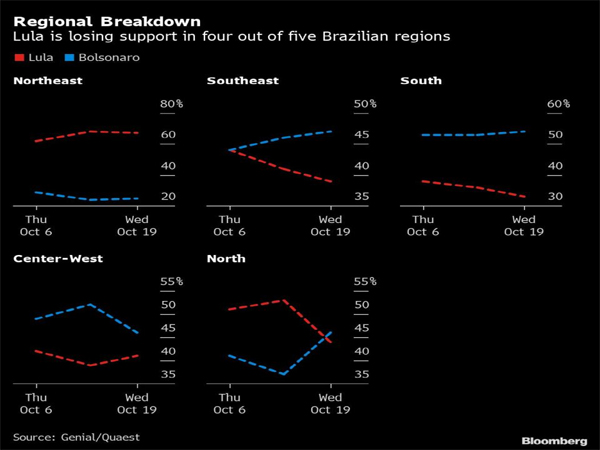
Brazil’s runoff presidential candidates, former president Luiz Inácio Lula da Silva and incumbent Jair Bolsonaro, are statistically tied ahead of the Oct. 30 second-round vote, according to a new Datafolha poll released yesterday. Datafolha said Lula now has 49% of voter support against 45% for Bolsonaro. The poll has a margin of error of 2 percentage points up or down, meaning both could mathematically be tied at 47%, reports Reuters.
The survey also showed that 94% of Brazilian voters have already decided on who they will vote for, leaving the candidates scrambling for the remaining 6%.
A Genial/Quaest poll, also released yesterday, gives Lula 5.6% lead, down from nearly 8 points two weeks ago. Lula is losing ground in four of Brazil’s five regions, particularly the Southeast, home to more than 40% of the nation’s electorate, according to Quaest. (Bloomberg)
And an Ipespe poll from Tuesday had the candidates statistically tied, though both moved within the poll’s margin of error. (Bloomberg)
Brazil’s presidential campaign has been particularly dirty this week, even by the very low bar set in recent months, with insinuations of cannibalism, pedophilia and devil worship, reports Reuters.
Bolsonaro has been hit particularly hard with attack ads that exploit old videos and recent slip ups, like an anecdote about visiting a group of “very pretty 14- or 15-year-old” Venezuelan migrants in a poor Brasilia neighborhood, apparently suggesting they were prostitutes.
Lula has faced a smear campaign from Bolsonaro backers accusing him of plotting to close churches if elected, explains Al Jazeera. The former president published an open letter to the country’s evangelicals, yesterday, promising to respect religious freedoms if elected — as he did during his 2003-2010 presidency.
Both candidates are courting evangelical voters ahead of the runoff vote. “Among Brazilians who identify as Catholics, 56% said they would vote for Mr. da Silva, compared with 38% for Mr. Bolsonaro, although polls have shown that Brazil’s Catholics are less motivated by religious issues when they vote,” reports the Wall Street Journal.
Bolsonaro has threatened to pack Brazil’s Supreme Court in a second mandate, threatening a key democratic check on his power. But he is waffling on the issue ahead of the second round, making threats to galvanize his base, then backing down to reassure undecided voters ahead of the runoff, reports AFP.
More Brazil
- YouTube and Facebook are allowing disinformation to be spread about Brazil’s election campaign, according to a new report by Global Witness. The NGO produced a series of purposely misleading ads about the election — YouTube approved all of them to run and Facebook approved half, reports the Guardian.

Haiti
- Haiti is in the midst of a dire crisis, but interim Prime Minister Ariel “Henry’s call for an international security presence is deeply problematic,” writes Scott Freedman in the Aula Blog. Few in Haiti believe foreign intervention would avoid the mistakes of the past, and Henry lacks legitimacy for such a request.
- A U.N.-proposed plan to send armed forces into Hait will result in predictable catastrophe, the Biden administration’s former envoy to Haiti, Dan Foote, told the Intercept. “An armed intervention would likely produce a short period of calm, he said, but would fall apart sooner or later.” He accused the U.S. of supporting Henry’s government in exchange for accepting migrant deportations.
Migration
- Migration advocates worry that this year’s hurricane season will cause a displacement crisis in Central America similar to that spurred by Hurricanes Eta and Iota in 2020, reports Al Jazeera.
Mexico
- The U.S. Treasury Department sanctioned individuals linked to Mexico’s powerful Sinaloa drug cartel, yesterday, days after bilateral security talks aimed at cracking down on trafficking of fentanyl and other contraband, reports Reuters.
El Salvador
- Around 77% of El Salvadorans believe the adoption of Bitcoin as legal tender in their country was a massive failure, according to a study conducted by the University of Central America (UCA). (Bitcoinist)
Colombia
- Colombian lawmakers approved increased spending for education, health and agriculture, part of a record-high, $85.5 billion budget for next year, reports, Reuters.
Chile
- Police clashed with small groups of protesters in Chile on Tuesday, the third anniversary of massive social protests against inequality, reports Reuters.
- President Gabriel Boric vowed to push through reforms, noting that little progress has been made in addressing the explosive social discontent that fueled the demonstrations in 2019. He said, the government must end the “drought” in legislative changes through greater dialogue in order to meet social demands, reports Bloomberg.
- Boric’s approval rating has fallen to its lowest level since he took office in March, according to the latest Cadem poll. (Latin America Risk Report)
Culture Corner
- Chilean Nobel literature laureate Pablo Neruda is being called out by Chile’s growing feminist movement as a male chauvinist and sexual predator, reports NPR.
Jordana Timerman / Latin America Daily Briefing
http://latinamericadailybriefing.blogspot







